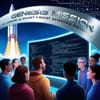The U.S. government under Donald Trump has launched a sweeping new initiative — the Genesis Mission — aimed at using artificial intelligence to turbocharge scientific research and innovation. Under an executive order signed on November 24, 2025, the plan seeks to combine the nation’s federal scientific datasets, supercomputing capacity, research labs, and private‑sector AI capabilities into a unified “AI experimentation platform.”
At the heart of the mission is the creation of the Department of Energy (DOE)-led infrastructure called the American Science and Security Platform. This platform is designed to host high‑performance computing environments, AI‑based modeling frameworks, and secure access to federal data across multiple domains. It will support large-scale model training, simulations, and even automated laboratory workflows — what officials describe as a “closed‑loop AI experimentation” system.
The mission targets a wide range of “grand challenge” areas including biotechnology, nuclear fusion and fission, advanced manufacturing, critical materials, quantum science, semiconductors, and space exploration. By applying AI to these fields, the initiative aims to accelerate breakthroughs that might otherwise take years or decades under traditional research methods.
At the same time, Genesis Mission is being framed as a strategic move in the global AI race. With backing from private companies and national labs, the U.S. hopes to leverage its existing scientific infrastructure to regain or maintain technological leadership. Still, critics point to challenges: scaling such infrastructure will require massive resources, and there are valid concerns about energy consumption, data security, and whether AI‑driven science can deliver on its ambitious promises.


